

Abstract
“Whale Whispering, Yes” is a window into my project, Whale Whispering, and its focus on community gatherings for collective singing and water healing work through the lens of the Whale Whispering at Lincoln Beach event that took place during the Imagining America 2021 conference in New Orleans. Offering details about the project and some history of New Orleans’ highly celebrated Black beach during the era of segregation, the piece incorporates links to photos and videos to bring Whale Whispering to life and draw attention to the work of local Black activists currently stewarding the beach and demanding attention to social and environmental concerns in the New Orleans East neighborhood.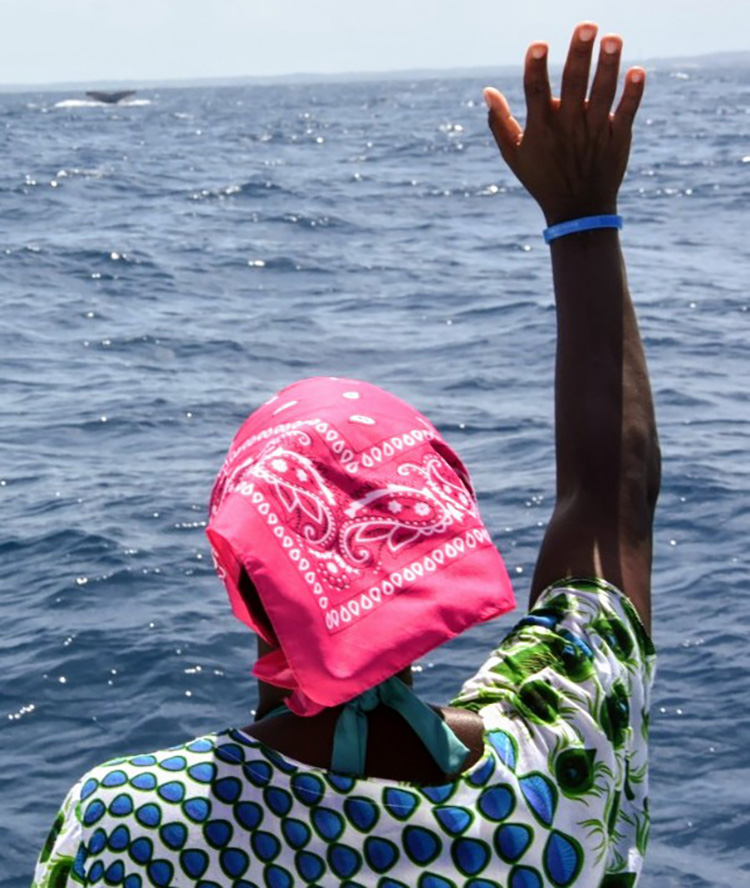
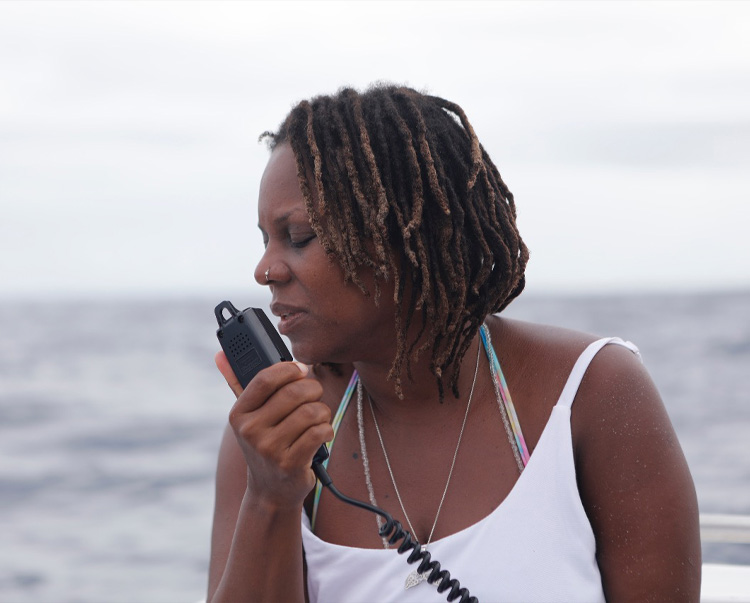
Just say yes and listen, and then go with the flow.” That’s how I summed up my Whale Whispering process during Imagining America’s 2021 National Gathering plenary conversation between cultural organizer Jayeesha Dutta and me. We were talking specifically about beginning the journey of sharing the project in community settings as healing technology while it is a creative work-in-progress, though the quote (which is now the first line of a Whale Whispering song) does speak to my general approach to the work as a whole. For Imagining America, the flow led me to bring that technology to Lake Pontchartrain in New Orleans via Whale Whispering at Lincoln Beach, a gathering that took place on October 18, 2021. My intention was to share blessings for the waters and spirits of the lake that was a source of so much inspiration and comfort for me during my time as a resident in the city, to highlight the work of Sage Michael and other activists stewarding the ecosystem and exalting the historical significance of this tiny oasis in The East (the neighborhood formally known as New Orleans East), and to offer a mini sound-healing retreat to local folks. I’ve heard so many stories about Lincoln Beach from Black New Orleanians who lived through segregation in the city and I know firsthand how palpable the lingering radiance of those glory days is, so it felt like an ideal environment for a Whale Whispering sharing. I had already organized gatherings by the bayou in City Park and at the Mississippi River earlier in the year1 as a way of offering this medicine to the communities and to the waters I love.
Whatever Whale Whispering is, it is not linear. It is circular and cyclical in its progression and expression, informed by the whales’ movements and communications. It’s so much more than what I understood it was becoming when I first said yes to it, and it is becoming so much more than what it currently is. Here’s a working synopsis of the practice:
Whale Whispering is an ancestral commission; an ode to water; a work of interspecies translation and cocreation between me, humpback whales, other cetaceans, and people; a diasporic healing quest; an exploration and transmutation of the legacy of trans-Atlantic enslavement. It is a soundtrack for personal, communal, and global transformation; a love song for whales, for Bahia, for Earth, for the ancestors and for life; a siren call summoning awareness of the unity of all being(s), resonating with the movement toward planetary healing as a vibrational antidote to global destruction. It is womb work.
I sing to and with humpback whales in Bahia, Brazil, a place where my spiritual and other relational bonds run decades-deep. I am initiated to Yemoja/Yemanjá in the tradition of Candomblé, a spiritual practice rooted in reverence for nature that evolved from the dedication of enslaved and formerly enslaved Brazilians of African descent to the maintenance of the ancestral traditions they brought across the Atlantic during and after the Middle Passage. As a daughter of the orisha (deity) known as the Mother of the waters and the fishes, I’m creating a body of songs with/inspired by the whales, tapping into their ancestral memories of witnessing and accompanying these voyages, of hearing and responding to the sounds coming from the ships as a way of accessing my own ancestral memory and connection. I am listening, with my ears and via telepathy, dreaming, channeling, and time-dissolving ancestral integration. I am listening to and through my womb to the personal and generational trauma stored there, funneling its release through songs and words, and sharing what’s being birthed through recordings of the music as well as a documentary film and/or series of films along with myriad public performances and community gatherings. I bring songs as offerings to the water as so many others have and do, and to the whales, who are always moving with the music and the stories it carries. In the video below, filmed in Bahia in 2019, they’re frolicking to “This Little Light of Mine,” which has turned out to be a hit with them.
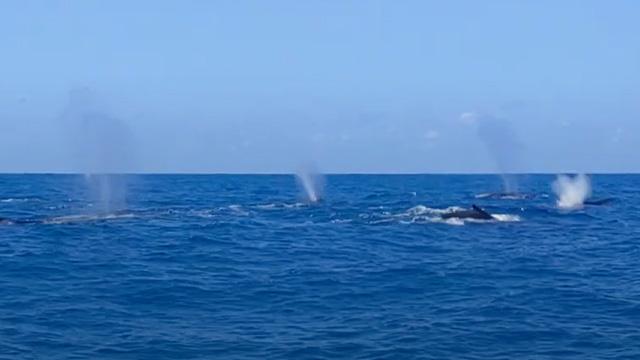
Figure 3: A Pod of Whales Dances to “This Little Light of Mine” - YouTube. Video by Eduardo Melo.
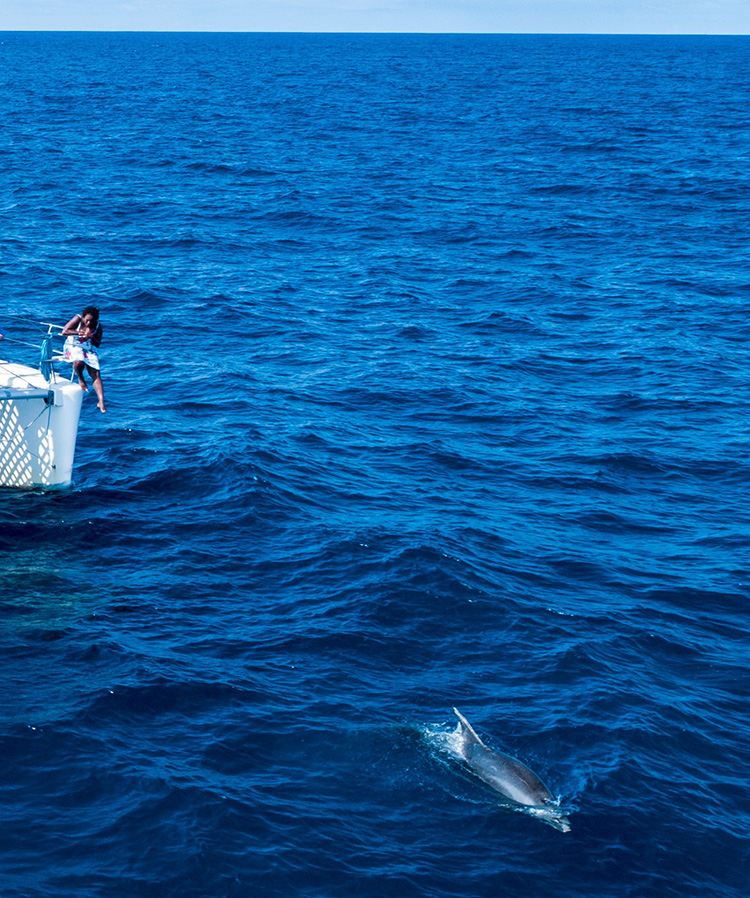
Whale Whispering is best understood by showing rather than telling, and I’d like to offer more insight into what it is by showing how I’ve been sharing it in community contexts, with particular attention to the most recent gathering in New Orleans/Bulbancha2 at Lincoln Beach. The Whale Whispering page on my website (www.michaelaharrison.org/whale-whispering) features a multidimensional rabbit hole that includes a blog, songs, videos, and hours of deep delving for anyone who’s interested in a more comprehensive examination of the project and how it came to be. New Orleans was my home for 17 years pre-pandemic. Focusing on local community initiatives/needs around water and incorporating the voices of Black New Orleanians are among the ways I work to keep Whale Whispering in loving relationship to the people and the place whose backbeat will always be woven into the rhythm of my heart.
Before I hone in on Lincoln Beach, though, a glimpse at some of Whale Whispering’s foundational elements and the meandering trajectory leading up to the Lincoln Beach event will help to clarify how I got there. First, I give thanks for water—
Omi-O!
Hail water! This simple Yoruba phrase is commonly used to exalt water, to activate the healing properties of water in ritual settings, and as a salutation to Yemoja and sometimes Oshun (deity of fresh water, creativity, fertility, love, and abundance). I introduce it here with gratitude for the infinite ways water gives of itself and shows up to represent for the miracle that life is. I give thanks for the courses it charts through my body on its mission to nourish every cell and circulate the blood river in me. Thank you, river of mine, thank you, all rivers, oceans, lakes, clouds, rainbows, sewers, swamps, rain, snow, dew, fog. Modupé (thank you) Yemoja, modupé Oshun, modupé Olokun (deity of the ocean and the treasures—both physical and spiritual—it holds in its depths). The video that follows is a collage of scenes and sounds filmed at beaches, creeks, and rivers in Brazil and in the US, and is an ode to water and these spiritual entities who inspire, guide, support, and illuminate Whale Whispering at every turn. I invite you to deepen your breathing and tap into gratitude for water as you take it in.
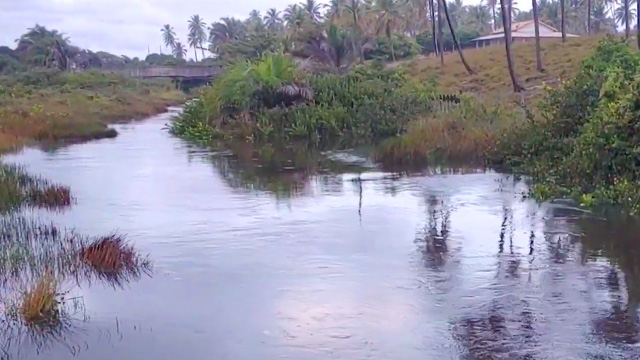
Figure 5: Love Water - YouTube.
Video by Michaela Harrison.
Living, responsive source and sustainer, common denominator of all organic beings, water is the great unifier on the level of physiology. It has the capacity to connect us on the level of consciousness as well when we tap into it as more than a material resource—a knowing that has been held by Indigenous peoples worldwide since long before science was a thing. When I first read the work of Dr. Masaru Emoto about water’s consciousness, beginning with The Hidden Messages in Water (2004), it was clear to me that it corresponded directly with the foundational understanding behind the offerings that are made in the name of the deities at different bodies of water in Candomblé. While his experiments and conclusions have been dismissed as pseudoscience by some, they helped me shape a bridge between doing water work in the context of traditional rites, like the annual Festa D’Yemanjá in Bahia, and extending the healing power of such practices to people of diverse backgrounds and beliefs. The 2020 Festa D’Yemanjá in Praia do Forte, Bahia, is pictured here, with offerings for Yemanjá and Oshun being carried to the shore where fishing boats wait to take them out to sea.
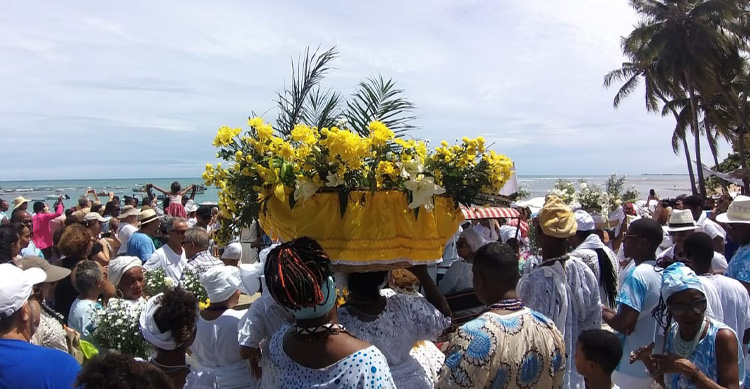
In my personal practice I have been learning directly from water, the orisha, and my ancestors for decades, and in the four years since I began Whale Whispering, I’ve been aware of learning directly from the whales as well. Sometimes information and guidance come as a rush and mash-up, spilling in from all directions at once, but most often there’s an internal filter at work that allows me to identify the source of the guidance. The “Omi-O Chant,” featured in the next video, came directly from the whales—both as an answer to my request for their support with accessing the essence of the sounds from the slaving vessels on the Atlantic and as a tool to share with others for the purpose of entraining the waters within and between our bodies and the waters without. The whale relatives were emphatic from the beginning in giving me the charge to gather people together to sing to water and whale song in support of the healing and remembering that are needed in this time of such pervasive turmoil, such immense possibility. Many people are hearing water’s call and being moved to come together across cultures to share space, exchange blessings, hold ceremony with water. I had the gift of participating in the 2020 Sacred Waters Pilgrimage, which was sponsored by the Gulf Coast Center for Law and Policy (https://www.gcclp.org) and cohosted by Wind and Warrior, a stellar collective of authentic and qualified Black priests/healers/activists (https://www.windandwarrior.com), who are among my dearest soul sisters and with whom I have engaged in collective healing work over many years and in various settings. I brought the chant to the Sacred Waters Pilgrimage community during one of our earlier meetings, and it became one of the songs the collective of Indigenous and Black women, two-spirit, trans, and gender-expansive folks from around Turtle Island usually sang when we came together to focus our energies on halting and healing the damage being done to the Mississippi River and connected bodies of water, and to mend and fortify relations between Black and Indigenous people. I’m honored that the chant was used as the soundtrack for the video representing the “Water” pillar of the Red, Black, and Green New Deal’s National Black Climate Agenda (www.redblackandgreennewdeal.org) when it was launched last year. The self-made video below features a split screen with multiple scenes of me singing next to the mighty, churning Potomac River during my remote participation with the travelers. It lends itself to the simple ritual of blessing a glass or bowl of water as it plays and affirming the healing and protection of all waters, which I invite everyone reading this to do. After singing to/speaking blessings over the water, it can be drunk, used to anoint yourself, or poured into a plant or onto the earth as you see fit.
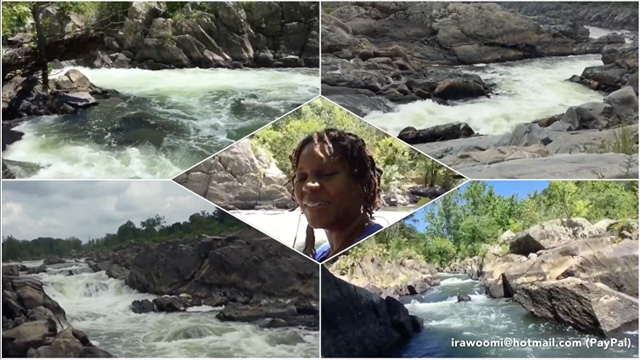
Figure 7: “Omi-O Chant” - YouTube.
Video by Michaela Harrison.
The platform for the practices and creative works that have emerged as Whale Whispering over the last few years has expanded exponentially as a direct result of the ways it has been embraced by a few key supporters. Dr. Alexis Pauline Gumbs, author of so many seminal, genre-expanding Black Feminist texts, began her social media posts on marine mammals, which would eventually morph into her ice-breaking book Undrowned: Black Feminist Lessons from Marine Mammals (2020), the same month that I went to Brazil to take Whale Whispering directly to the whales for the first time. She promoted my GoFundMe campaign to her followers through her posts and helped generate a significant portion of the contributions that sustained me through those early phases of the project. Our conversations about ancestors, listening, and surrender left us both marveling at the synchronicities between our callings and were uplifting and crucial to my perseverance in moments when I felt daunted by the scope of this “assignment” (to use her language). In 2020, I attended one of her writing workshops offering support with tapping into ancestral wisdom and had a major breakthrough in terms of exploring the scope of my ability to connect written language to the process of peering into the murky fathoms of my own generational trauma as it relates to this work. This breakthrough eventually led to the creation of my blog for the project. So many people found their way to Whale Whispering through its mentions in Undrowned, and I am forever thankful for Alexis’s sisterhood—and her sublime writing, which has been incorporated into Whale Whispering gatherings through the sharing of excerpts from the book. In 2019, the year after Whale Whispering began, writer adrienne maree brown invited me to do a workshop on it at the Emergent Strategy Immersion (Emergent Strategy Ideation Institute - Allied Media Projects) that took place in New Orleans, and though I had no idea what that would look like and hadn’t yet read her modern classic, Emergent Strategy: Shaping Change, Changing Worlds (2017), I said yes. Emergent Strategy, which lucidly interrogates and guides processes of adaptation and the building of effective movements for social justice through the lens of Octavia Butler’s wisdom on the preeminence of change, emphasizes the observation of and interaction with nature as one of the keys to both surviving and shaping the current upheavals we all face as Earthlings. Once I read the book and understood how completely in sync with it everything I was doing was, I created and presented a workshop that sprouted a whole new, core branch of this work focused on sharing it in community spaces.
With the understanding that the Emergent Strategy Immersion experience gave me, Whale Whispering unfurled in new directions, leading to numerous events near natural bodies of water as well as online. I’ve witnessed over and over how thoroughly altering and healing the whale songs are when introduced to communal spaces and how extensive their capacity to magnify collective focus and intention is; their effect is something similar to that of a tuning fork or certain types of plant spirit medicine. This expansion of the vision for this work has resulted in various opportunities and invitations to share the work/collaborate in ways that have propelled my evolution as a healer and brought together hundreds of people thus far for a series of sharings that have been sparkling with spirit and doused in wonder, which was most certainly the case during Whale Whispering at Lincoln Beach.
In its heyday, Lincoln Beach was a mecca of leisure and entertainment for Black folks from all walks of New Orleans life, a haven offering access to Lake Pontchartrain far from the dangers of whites-only spaces on the other side of town. I’ve heard many tales of how fabulous it was from its opening in 1954 until 1964 when desegregation resulted in its closure and subsequent neglect by the city government. Sam Cooke played there, as did Ray Charles, Nat King Cole, Irma Thomas, and the Neville Brothers, among others. While its facilities were known to be inferior to those at the all-white Pontchartrain Beach, Lincoln Beach boasted three pools, an amusement park and restaurant, and, perhaps most importantly in the New Orleans context, community.
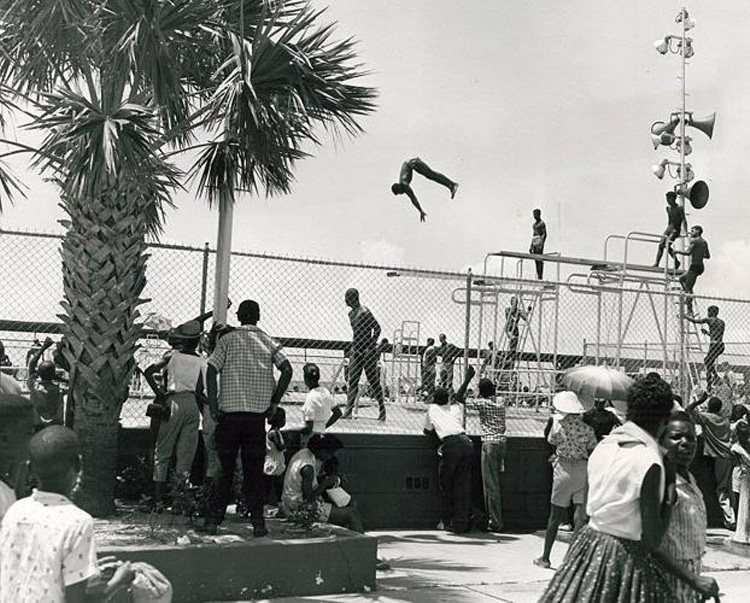
Located in The East, one of the last Black neighborhoods to remain relatively unscathed by gentrification due to its geographical location and propensity toward extensive flooding and damage during intense hurricanes, Lincoln Beach has been officially off-limits to the public for decades, with a levee wall, railroad tracks, and acres of overgrown brush making it challenging to access. But folks have been getting to it anyway, drawn by its tranquility, seclusion, great fishing, and incredible sunsets, and a small but dedicated group of people from New Orleans East have taken on stewardship of the beach and its surrounding forest, gathering up tons of trash, cleaning debris from the shore, and setting up sitting areas and grilling pits for visitors to enjoy. The mayor’s office is now turning its attention back to the area and awakening to its potential, in part as a result of the insistence of those very stewards who have been excluded from many of the discussions on the redevelopment that they’ve been demanding for years.
I wanted to take the opportunity offered by Imagining America to put a focus on Lincoln Beach and the actions of the New Orleans for Lincoln Beach collective because they highlight the ways in which Black people have been denied (easy) access to the healing, nourishing benefits such environments can offer, both historically and in the post-Katrina reality of New Orleans. They also provide an example of how a handful of locals who refused to back down have sparked a movement that is gaining traction and becoming a force to be reckoned with—one that is increasingly difficult to ignore. I remember weekend nights in pre-Katrina New Orleans when a ride along the lakefront in pleasant-to-broiling weather invariably meant encountering hundreds if not thousands of Black folks of all ages gathered on the levee for miles, from back near the University of New Orleans Lakefront Arena to the West End. Fishing, grilling, eating crawfish, playing cards, listening and dancing to music blaring from car stereos, enjoying the cooler breezes, and simply gazing out at the water were ways that Black folks claimed their right to enjoy nature’s bounty, en masse and for free. For many years after Katrina, the lake was closed at night, supposedly due to insurance issues, but when it finally did reopen it was with limited nighttime access and heavy policing, which had the effect of squashing any potential resurgence of the scene that had once been so essential to Black New Orleans.
Bringing Whale Whispering to Lincoln Beach was about acknowledging some of the reasons why so many Black people have PTSD associated with water, whether it be the collective psychic imprint of the Middle Passage; the long-term violence of segregated beaches, pools, bathrooms, and fountains; or the harrowing experiences of Katrina’s inundation. It was also about creating and holding a container in which the Black joy and brilliance that had once been in abundance on the grounds (and in countless segregated spaces) could be conjured and celebrated through the stories of elders who experienced its golden era. A few of them are included in the video of the day’s events, below. As is the case with all Whale Whispering gatherings, healing was the driving intention; the whale song and collective singing provided release and brought an added layer of peace and inspiration to the space that even the fish seemed to sense as they vaulted continuously over the lake’s surface. Those gathered held a shared vision for a future Lincoln Beach where reinvestment in the area by the city looks like safe access to and regular maintenance of the site while keeping its forested ecosystem intact, and does not equal a hijacking in the form of development designed to send tourists rushing in at the expense of the entire neighborhood. Sage Michael, who is the most visible and vocal of the beach’s stewards and has a camp there, is regularly featured in local media coverage and has an ever-increasing number of followers of his social media chronicles about his community service—and demands. It’s my hope that the testimony that appears in this video generates new support for Sage Michael (@Sageville), Reggie (@reggieart), Tricia Wallace, and New Orleans for Lincoln Beach (on Facebook) in the form of followers, contributions, help with clean-up, and more voices amplifying their requests for inclusion in the city’s planning for the beach’s future.
The video of the gathering was gorgeously filmed by jazz franklin, Rashida M. Davidson, and Mel Cardona and edited by jazz franklin and Rashida M. Davidson. Toward the end, it offers a glimpse of Sage Michael discussing the situation at Lincoln Beach from his perspective (while holding one of the whale bones I found in Bahia as a talking stick). It also features me sharing a few of the Whale Whispering songs, some excerpts of the audio files of me singing underwater with the whales, the creation of a fire and of a spiral altar with found objects, and the offering of songs and rose petals to the water by a vibrantly diverse group of New Orleanians, some of whom are newly aware of and in support of this important grassroots activity happening in the city where they vote and pay taxes.
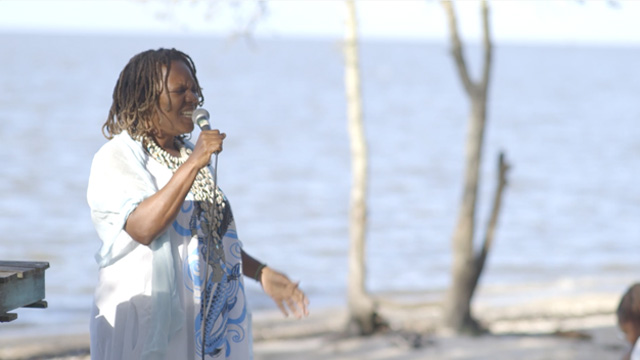
Figure 9: Michaela Harrison – Whale Songs at Lincoln Beach_ 12/21 (vimeo.com)
Video by jazz franklin.
Because it’s all a spiral, I circle back to gratitude in closing that is not closing, only a pause until the next level, manifestation, iteration is revealed. I marvel constantly at the truth of who I am as a descendant of survivors who had genes laced with superpowers and of those who did not survive but whose energetic imprint still reverberates in my life—and in this world—with a force that is impossible to ignore. I am grateful, so grateful, for their guidance, presence, legacies, inspiration. And to the whales (and dolphins), my beloved companions on this aquatic-terrestrial-oneiric odyssey, thank you so much for the gift of this connectedness, for this peek into the contents of your collective remembering, for the ways you have carried the stories of the Passage in your dirges, and for inviting me to come get them. Thank you for the wisdom you guard and reveal as you navigate the globe, for the healing vibrations you transmit with such generosity, for the compassion and grace you have shown me in all our encounters, and the ways you speak to me in and out of the sea, Omi-O! This water work is my reciprocity; I am committed to doing my best to protect and preserve the habitat you speak for with your bellowing voices, and I cede the “final” word in this jet stream of consciousness to you, via this last video. Sometimes I concentrate for years to understand a fragment of your recorded gurgling, but this one is easy to translate. You’ve taught me that you talk below the surface with your singing and above it with your breath. In this moment of such heartfelt exchange when I was singing out to you what the ancestors were pouring into me and listening to your responses from the depths, one of you emerged to spew the answer into air so that other ears could hear: a definitive, unmistakable
yes.
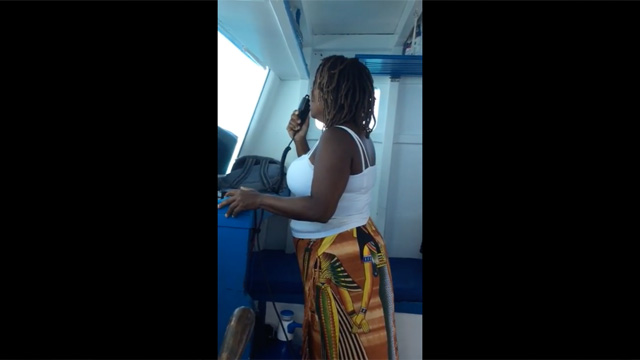
Figure 10: Lamento - YouTube.
Video by Jhonatas Cunha.
Notes
1 With the open-hearted support of New Orleans Center for The Gulf South and Antenna Gallery.
2 Bulbancha means “place of many tongues” in Choctaw and was the common name for New Orleans before French colonization. It has been reclaimed in recent years by Indigenous and other activists in and around the city.
Work Cited
Brown, Adrienne Maree. 2017. Emergent Strategy: Shaping Change, Changing Worlds. Chico, CA: AK Press.
Emoto, Masuru. 2004. The Hidden Messages in Water. Hillsboro, OR: Beyond Words Publishing.
Gumbs, Alexis Pauline. 2020. Undrowned: Black Feminist Lessons from Marine Mammals. Chico, CA: AK Press.
